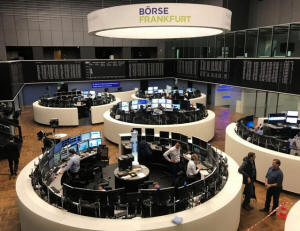|
Global stocks slip on Trump's new trade
salvo, traders await U.S. jobs report
 Send a link to a friend
Send a link to a friend
 [April 06, 2018]
By Tommy Wilkes [April 06, 2018]
By Tommy Wilkes
LONDON (Reuters) - Stock markets edged
downwards on Friday after U.S. President Donald Trump's threat to impose
an extra $100 billion in tariffs on China exacerbated fears of a more
serious trade dispute, while the dollar paused ahead of crucial U.S.
payrolls data.
European shares followed their Asian counterparts into the red but the
falls were limited, and the broader ups and downs for markets this week
suggest investors are not yet convinced the row will escalate into a
full-blown trade war that threatens global economic growth.
The dollar, which has tended to fall when trade tensions rise, was
largely flat but is up half a percent this week.
Britain's FTSE 100 dropped 0.13 percent while the German Dax was down
0.51 percent and France's CAC 40 0.48 percent.
The MSCI World Index slipped 0.08 percent, although it had erased most
of its earlier losses as markets calmed in European trading. S&P 500
E-mini futures cut their losses to 0.6 percent, pointing to a lower
start for Wall Street when it opens.

In Trump's latest salvo, he said late on Thursday that he had instructed
U.S. trade officials to consider $100 billion in additional tariffs on
China. Beijing warned it would fight back "at any cost" with fresh
measures to safeguard its interests.
"Any escalation in the trade war rhetoric would be more negative for
China than the U.S. given the former's relative dependency on trade but
for now, the markets are focused on the payrolls data," said Richard
Falkenhall, a senior currency strategist at SEB in Stockholm.
Friday's U.S. non-farm payrolls report, due at 1230 GMT, could determine
the pace of future Federal Reserve interest rate rises and the dollar's
direction.
Fed chairman Jerome Powell is also speaking later on Friday and
investors will be looking for any signs that rates could rise more than
an expected two further hikes this year. The Fed raised rates last
month.
The U.S. March employment report is expected to show non-farm payroll
growth of 193,000 jobs versus 313,000 the prior month, according to the
latest Thomson Reuters poll of economists.
Average hourly earnings are expected to have risen 0.2 percent last
month after edging up 0.1 percent in February. The gain would lift the
annual increase in average hourly earnings to 2.7 percent from 2.6
percent in February.
DOLLAR ON HOLD
The dollar weakened 0.1 percent against a basket of major currencies
with traders reluctant to take big positions ahead of the payrolls
numbers.

[to top of second column]
|

The German share price index, DAX board, is seen at the stock
exchange in Frankfurt, Germany, March 21, 2018. REUTERS/Tilman
Blasshofer/File Photo

Against the yen, which as a safe haven currency tends to be among the
most sensitive to global economic uncertainty, the dollar was flat. So
far this week the dollar is almost 1 percent versus the Japanese
currency, hitting its best level since late February, despite the
growing U.S.-China trade tensions.
Some Asian currencies showed signs of investor nervousness, however.
The Chinese yuan fell another 0.4 percent versus the dollar,
bringing week-to-date losses to 0.8 percent. The Korean won, heavily
exposed to global trade, also fell.
"The rising tide of economic nationalism is likely to be a
motivating theme in markets for the foreseeable future. There is
scope for behind-the-scenes pragmatism while sabres get rattled in
public, and that is probably the most likely outcome. But the fact
is when sabres get rattled, blood sometimes gets spilled," said
Joseph Amato, CIO of equities at Neuberger Berman.
Treasury debt prices gained and yields declined as investors sought
the safety of government bonds. Euro zone government bond yields
also dipped as the trade dispute between the United States and China
flared.
The 10-year Treasury note yield fell marginally to 2.8247 percent,
pulling back from Thursday's nine-day high of 2.838 percent.
Treasury yields had fallen further in Asian trading but the European
open calmed investors.
The yield on 10-year German government debt, the euro zone
benchmark, slid 1 basis points in early trade to a shade above 0.51
percent.

Crude oil prices fell after Trump's latest tariff proposal. O/R U.S.
crude slipped 0.44 percent to $63.26 a barrel and Brent was down
0.38 percent at $68.07 a barrel.
Gold prices were steady.
For Reuters Live Markets blog on European and UK stock markets open
a news window on Reuters Eikon by pressing F9 and type in 'Live
Markets' in the search bar
(Additional reporting by Shinichi Saoshiro in TOKYO; and Saikat
Chatterjee in LONDON; Editing by Andrew Bolton)
[© 2018 Thomson Reuters. All rights
reserved.]
Copyright 2018 Reuters. All rights reserved. This material may not be published,
broadcast, rewritten or redistributed.
Thompson Reuters is solely responsible for this content. |